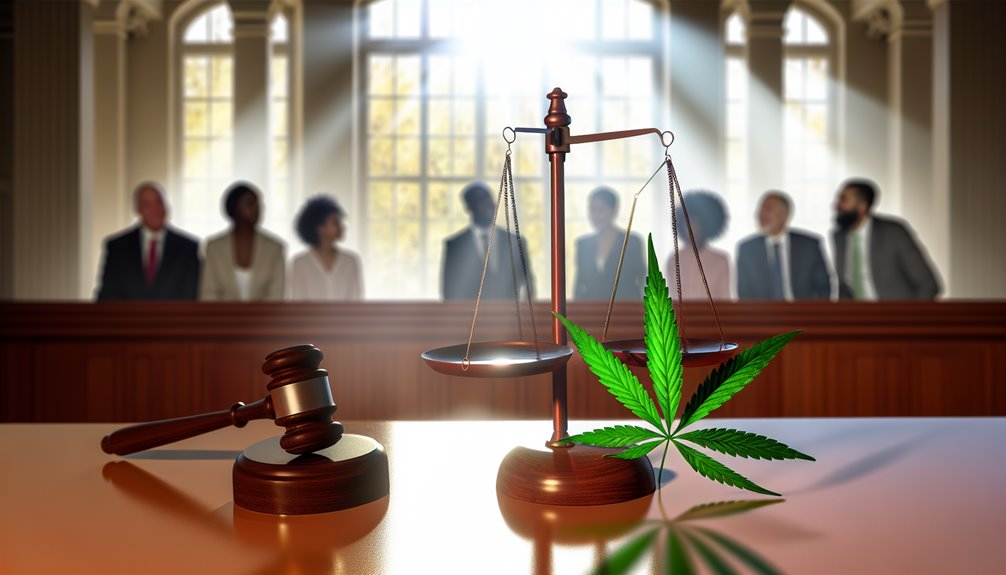If you’re a Maryland patient with past cannabis issues, you need to know a pardon forgives, but expungement erases access. After the 2025 reforms, eligibility narrowed and deadlines tightened, affecting licenses, caregiving credentials, and tenant or employment screening. You’ll want to match your case to the right statute, file in the originating court, and verify deletion across state and vendor systems. The catch is what still shows—and where—unless you act precisely and on time.
Why the Distinction Between Pardons and Expungement Matters for Patients

Even if a pardon feels like relief, it’s not the same as expungement—and that difference can determine whether your record still appears in court databases, background checks, and licensing reviews. You need clean records to protect medical privacy, preserve doctor trust, and avoid barriers to care, employment, and professional licenses. A pardon forgives; it doesn’t erase. Expungement seals or destroys records under specific Maryland statutes, limiting public access. That distinction supports patient advocacy and community outreach by removing stigma that can chill treatment, disclosures, and service opportunities. If eligibility exists, you should pursue expungement to guarantee compliance, dignity, and real second chances.
What the 2025 Maryland Cannabis Reform Changed
While headlines focused on licensing and taxes, the 2025 Maryland cannabis reform quietly tightened record relief and compliance rules that matter to patients. You now face narrower eligibility for expungement, stricter verification of medical status, and clearer court filing sequences tied to the legislative timeline. Agencies must purge data faster, yet new auditing triggers create implementation challenges for clinics and caregivers. You’ll need precise documentation, timely petitions, and clean compliance histories to secure relief. Serve your community by modeling best practices and staying audit-ready.
- Feel urgency: deadlines now truly matter.
- Feel clarity: rules read like checklists.
- Feel vigilance: audits intensify.
- Feel hope: clean paths exist.
Gubernatorial Pardons: Scope, Limits, and What Remains on Record

Because a pardon feels like a clean slate but isn’t one, you need to know exactly what a Maryland gubernatorial pardon does and doesn’t do. A pardon forgives the offense; it doesn’t erase the case file or guarantee record sealing. Your conviction may still appear in public court indexes, licensing checks, and federal databases. The Governor’s authority is executive, guided by statute and policy—and sometimes political optics. A pardon can restore civil rights and signal rehabilitation, but it won’t undo court-imposed facts or private background compilations. You should document eligibility, gather service-focused references, and verify each agency updates its records post-pardon.
Court-Ordered Expungement: How It Works and What Disappears
If you need a true clean slate in Maryland, court-ordered expungement—authorized under Criminal Procedure § 10-101 et seq.—is the mechanism that actually removes records from public view. You file a petition, serve required parties, and after statutory waiting or eligibility, the court orders removal from Maryland Judiciary Case Search, clerk files, and most agency databases. Unlike pardons, expungement mandates destruction or sealed records, with limited data retention for law enforcement and compliance audits. You protect patients, employers, and communities by honoring rehabilitation.
- Close the door on stigma.
- Restore trust and dignity.
- Safeguard sensitive health work.
- Lead with mercy, anchored in law.
Eligibility Pathways for Cannabis-Related Convictions and Civil Offenses

Even after legalization, Maryland treats cannabis records through defined routes that depend on the charge type, disposition, and date. You’ll follow different pathways for civil possession, misdemeanor use or possession with intent, and felony distribution. Civil citations tied to personal use are typically eligible for immediate expungement; dismissed or nolle prosequi cases qualify sooner. Convictions follow waiting periods, shortened for conduct now legal. Completing court-ordered rehabilitation programs can accelerate relief. Juveniles may access medical amnesty protections and sealed records. Pardons apply when statutory expungement isn’t available or an equitable remedy is needed. File in the originating court and verify FBI/State repository updates.
Impact on Employment Screenings and Professional Licensing
Securing relief under Maryland’s cannabis statutes matters most where it’s tested—background checks and licenses. A pardon forgives; expungement erases from routine public searches. Employers and boards read that difference. You’ll still navigate licensing disclosures even after a pardon; expungement may limit what you must report, subject to agency rules. For safety‑sensitive roles, expect heightened scrutiny. Document your compliance, treatment, and job performance. Advocate for workplace accommodations aligned with disability and medical-cannabis policies. Lead with transparency when required; assert sealing when permitted.
- Protect your calling.
- Reclaim trust with proof.
- Reduce stigma through compliance.
- Serve without shadows holding you back.
Housing Applications, Public Benefits, and Background Check Visibility

Start with where landlords and agencies actually look: routine tenant screens, public court dockets, and benefit-eligibility databases. For housing, a Maryland pardon forgives; an expungement erases records from public view. Tenant screening vendors typically pull civil and criminal indices; expunged cases should not appear. A pardon may still show the underlying case unless you expunge it. For public benefits, benefit eligibility checks reference disqualifying convictions; an expungement removes them from standard queries, while a pardon may require manual review. You should verify removal on Case Search, request vendor reinvestigation, and keep certified orders ready. Align relief choice with your housing and benefits goals.
Firearm Rights, Federal Law Conflicts, and Patient Risks
While clearing records helps with housing and benefits, you also need to weigh how pardons and expungements affect firearm rights under Maryland and federal law. A Maryland pardon may restore state gun eligibility, but federal preemption and 18 U.S.C. § 922(g) can still bar possession if disabilities persist. Expungement can remove state disqualifiers, yet federal databases may retain prohibitions unless the conviction is nullified with full civil rights restoration. Align relief with Maryland Public Safety Article and NICS rules. Document every order.
- Protect patients from inadvertent felony possession.
- Prevent denials on NICS checks.
- Coordinate court, MSP, and ATF records.
- Honor safety while restoring dignity.
Immigration Considerations for Noncitizen Patients and Caregivers

Even if you’ve cleared a Maryland record, immigration law treats convictions and admissions differently, so you must analyze federal consequences before seeking a pardon or expungement. DHS and DOJ apply INA provisions, not state relief rules. A gubernatorial pardon may not erase a “conviction” under INA §101(a)(48)(A); expungement often doesn’t affect removability or inadmissibility. Controlled-substance findings, paraphernalia, or “reason to believe” trafficking can trigger bars despite state relief. Conduct a precise Immigration screening for CIMTs, drug grounds, and false claims. Confirm how pleas, PBJ, or vacaturs were entered. Anticipate Visa impacts, adjustment risks, and naturalization timing before filing anything.
Step-by-Step Actions Maryland Patients Should Take Now
With federal immigration risks in mind, you should move methodically through Maryland’s relief options. Start by pulling your case history, charging documents, and final dispositions. Then map eligibility under current statutes for pardon, expungement, or shielding, prioritizing medical privacy and caregiver rights tied to your patient role.
- Gather certified records and your medical program documentation—build a clean, accurate file that honors those you serve.
- Consult counsel versed in post-conviction and immigration—minimize downstream exposure before acting.
- File the narrowest, statute-supported petition first—sequence to avoid adverse disclosures.
- After orders issue, update background checks, licensing files, and caregiving credentials—verify compliance.
Conclusion
As we navigate the complexities of pardons and expungement together, I want you to know that we’re here for you every step of the way. At Fells Point Cannabis Docs of Maryland, we understand how important it is to protect your future and ensure that your past doesn’t hold you back. If you have any questions or need guidance on the expungement process, please don’t hesitate to visit us in person or give us a call at (410) 401-4200. We’re always ready to help you with a warm smile and the support you need. Let’s work together to chart your path forward!
